Foundation cracks are going to appear in your basement, and they are normal. The type of crack you have however could be a problem. Almost every single home that has a buried concrete foundation will develop cracks in the walls or floor slab. Properly identifying the cracks and repairing properly is key.
Here are the most common cracking types.
- Horizontal Crack
- Stair Step Cracks
- Poured Foundation wall Cracks
- Foundation Slab Cracks
Horizontal Crack

Horizontal cracks in your basement foundation are serious. This type of crack is often due to unbalanced soil and hydrostatic water pressuring pressing against your foundation wall. You may notice the foundation bowing inwards and water leaking into your basement. Both block and poured foundations can develop horizontal cracks. These cracks are easy to identify and should be addressed by a professional ASAP.
In Windsor, horizontal cracks are common due to many reasons. The most common are the homes drainage system does not work properly giving the soil around the home no opportunity to drain effectively. This Heavy soil bares its weight against the wall which will cause the wall to bow in, especially if it is a clay type soil surrounding the home. No matter what the cause you should reach out to Supreme Basement Solutions to schedule a free no obligation inspection today!
Stair Step Cracks

Step cracks only occur in block walls, so if you have a poured foundation then you need not to worry about step cracking. (A block wall is a wall that is made by stacking together 8″x16″ cinder blocks with mortar in between). These types of cracks happen along mortar joints and pose a serious threat to the integrity of your basement foundation. This problem can be serious as it could be your home is actually settling which will cause the home to become unlevel. Or it could just be occurring because the soils around the home are creating to much hydrostatic pressure against the wall.
While some mortar-based hairline cracks are common, it should still be inspected by a foundation repair specialist. Supreme Basement Solutions offers a free no obligation inspection so if you suspect you may have step cracking in your foundation don’t hesitate to call.
Vertical or Horizontal Cracks
These cracks are very common in any poured foundation and usually appear within one year of the home being built. (A poured foundation is a continuous pour of concrete so your basement walls look like solid concrete with no seems.) The problem with hairline cracks is they almost always leak! Do not finish your basement
without repairing any hairline cracks that may be present.
These are usually caused by the settling and drying of the new foundation. The good news is these cracks are usually superficial and can be permanently repaired by a professional.
If you purchased a new home and discover a foundation crack, contact your home builder right away. Your warranty may cover the repair of the hairline crack.
Make sure to take photos to document the crack and monitor progression. If you would like professional advice feel free to reach out to Supreme Basement Solutions to schedule a free inspection. When Supreme Basement Solutions repairs cracks they back them by a lifetime transferable warranty!



Foundation Slab Cracks
If your home has a basement then chances are it has a Poured concrete slab. Concrete slabs are prone to developing cracks over time. Slab cracks are not always a problem as long as you know why the slab cracked in the first place.
If the cause is improper concrete Curing: This is the most common reason and it is caused by natural drying, settling, and curing of the concrete slab. This poses no structural threat and is mostly cosmetic and appear as hairline cracking in the floor.
Another cause is slab settlement: If a new foundation slab develops settlement issues you are in trouble. This may be caused by poor workmanship where the supporting ground was not compacted or poor soil conditions.
Lastly it can be caused by hydrostatic pressure build up under the slab. If you basement does not have a proper drainage, or failed drainage system installed then the build up of water can force its way through the slab causing it to crack. Sometimes water will even come from these cracks as well.
In any case if you have cracking in your concrete slab you should have it inspected. Especially if you plan on finishing the basement.




